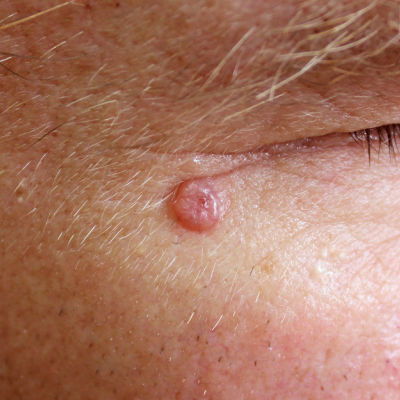Written by Dr. Ringpfeil

Basal cell carcinoma is the most commonly occurring malignant skin tumor and is a slow-growing form of non-melanoma skin cancer. It originates in the top layer of the skin known as the epidermis. Risk factors for this type of cancer include light-colored skin, blue or green eyes, blond or red hair, and excessive exposure to UV rays and radiation.
Basal cell carcinoma rarely spreads internally, but if left untreated, it can extend into surrounding areas, nearby tissues, and even bone. Most cases of this cancer occur on sun-exposed areas of the skin.
Basal cell carcinoma may appear similar to normal skin, with characteristics such as a pearly or waxy bump or growth that can be white, light pink, flesh-colored, or brown. In some cases, the affected skin may be slightly raised or flat.
The presence of a new skin growth that bleeds easily or fails to heal properly can be an initial sign of basal cell carcinoma. Diagnosis involves a thorough medical history assessment, examination of the affected skin area (size, shape, color, and texture of suspicious areas), and often a biopsy for further evaluation by a pathologist.
Complete removal of the basal cell cancer is the primary treatment objective. The local recurrence rate for basal cell skin cancer ranges from 1-10% depending on the treatment method. If left untreated, basal cell carcinoma can cause damage by spreading to nearby tissues or structures, particularly around the nose, eyes, and ears.
Basal cell carcinoma rarely metastasizes to other parts of the body. However, its occurrence indicates significant radiation exposure throughout one’s life, increasing the likelihood of developing additional basal cell carcinomas. Monthly self-examinations of the skin are crucial for detecting any suspicious changes, and regular follow-up appointments with a doctor are highly recommended.
Various treatment options are available for basal cell carcinoma, and the most suitable approach depends on the type, location, and severity of the tumor. Common treatments include surgical excision (including Mohs’ surgery when necessary), electrodesiccation and curettage, freezing, laser surgery, and topical medications such as Tazarotene (Tazorac), imiquimod (Aldara), and 5-fluorouracil. Prescription medications require careful monitoring for severe skin irritation and potential systemic side effects.
Effective coping strategies for basal cell carcinoma primarily involve limiting sun exposure during leisure activities and outdoor work, as further exposure increases the risk of developing basal cell carcinoma on other sun-exposed areas of the skin. Additionally, individuals must adjust to changes in their skin caused by the primary cancer and the subsequent scar after removal.
Depending on the severity, coping with basal cell carcinoma may involve dealing with the psychological impact of having cancer, including feelings of worry, fear, irritation, doubt, guilt, and anxiety. Understanding the causes of the disease and implementing preventive measures are essential for managing it.
The most effective way to prevent basal cell carcinomas is by reducing exposure to natural and artificial sunlight. Protecting the skin by wearing hats, long-sleeved shirts, long skirts, or pants is recommended. Regular use of high-quality sunscreens that block both UVA and UVB light is crucial. Sunscreen should be applied at least 30 minutes before going outside and reapplied every 2 hours. It is important to use sunscreen on exposed areas of the skin throughout the year.
Patients ask Dr. Ringpfeil answers
Please feel free to use this form to ask our dermatologists questions about this treatment.